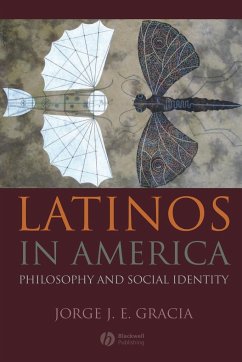What is it to be Latino? What is the place of Latinos in America? And how do Latinos think about themselves and their identity? This is the first book to ask and answer these questions in a philosophical context. It rejects answers based on stereotypes that feed the fear generated in both the Latino and non-Latino population by the enormous growth of Latino numbers in the United States. And it proposes a new way of thinking about Latinos based on a familial-historical view that allows for negotiation, accommodation, and change. The task is accomplished in three parts. The first goes to the source of misunderstandings concerning Latino identity, the problem of Latino identification, and the significance of the two general labels used to refer to Latinos, 'Latinos' and 'Hispanics'. The second part explores the problems encountered by Latinos in American society, paying particular attention to the marketplace, affirmative action, and language rights. The third part looks into who Latinos think they are by proposing an original conception of Latino philosophy with roots in Latin America, and by discussing the place it occupies in American and world philosophy.
Hinweis: Dieser Artikel kann nur an eine deutsche Lieferadresse ausgeliefert werden.
Hinweis: Dieser Artikel kann nur an eine deutsche Lieferadresse ausgeliefert werden.
"Philosophy professor Gracia offers a welcome contribution to the discussion regarding identity formation and, specifically, the role this plays in the lives of Latinos. His comprehensive account grapples with the potential misunderstandings associated with Latino identity ... .Gracia makes an original contribution at every step of the way, challenging readers to drop the usual either/or-type thinking that governs identity politics. There is little doubt that this book provides the penetrative analysis necessary to confront these concerns. Useful for undergraduate students, graduate students, researchers, and faculty concerned with identity formation and Latin American philosophy generally. Highly recommended." (Choice Reviews, December 2008)"Gracia's book offers engaging and provocative discussions ofethnicity, race, immigration, multiculturalism, justice, democracyand world philosophies. Gracia's rich and multilayered discussionsof these timely topics are masterfully crafted in a manner thatmakes original contributions to ongoing debates while raising newquestions and shaping the agenda across different academicdisciplines."
-José Medina, Vanderbilt University
"If originality in philosophy is measured by the novelty of theideas employed to deal with ancient problems, Jorge Gracia's bookLatinos in America is at once original and a novelty.Spinoza believed that every thing wants to persevere in its presentform: a tree wants to be a tree, and a dog a dog. Latinos inAmerica want to be Latinos in America--no easy task, and thereforean intriguing one to explore. Building his argument with acumen andconviction, Gracia is up to that task."
-Ilan Stavans, author of The Hispanic Conditionand Spanglish: The Making of a New American Language
"This is an essential book for anyone interested in LatinAmerican philosophy, including questions of race, Latino identity,ethnic group terms, linguistic rights, affirmative action, and therole of history."
-Susana Nuccetelli, St. Cloud State University
-José Medina, Vanderbilt University
"If originality in philosophy is measured by the novelty of theideas employed to deal with ancient problems, Jorge Gracia's bookLatinos in America is at once original and a novelty.Spinoza believed that every thing wants to persevere in its presentform: a tree wants to be a tree, and a dog a dog. Latinos inAmerica want to be Latinos in America--no easy task, and thereforean intriguing one to explore. Building his argument with acumen andconviction, Gracia is up to that task."
-Ilan Stavans, author of The Hispanic Conditionand Spanglish: The Making of a New American Language
"This is an essential book for anyone interested in LatinAmerican philosophy, including questions of race, Latino identity,ethnic group terms, linguistic rights, affirmative action, and therole of history."
-Susana Nuccetelli, St. Cloud State University








